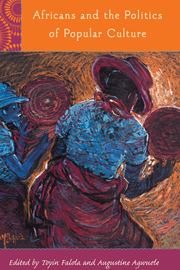Book contents
- Frontmatter
- Contents
- List of Illustrations
- Preface
- Introduction
- 1 From Primitive to Popular Culture: Why Kant Never Made It to Africa
- Part One Politics of Culture in Habitual Customs and Practices
- Part Two Politics of Culture in Popular Representations: Films and Performances
- Part Three Politics of Culture in Popular Texts
- List of Contributors
- Index
- Rochester Studies in African History and the Diaspora
1 - From Primitive to Popular Culture: Why Kant Never Made It to Africa
Published online by Cambridge University Press: 12 September 2012
- Frontmatter
- Contents
- List of Illustrations
- Preface
- Introduction
- 1 From Primitive to Popular Culture: Why Kant Never Made It to Africa
- Part One Politics of Culture in Habitual Customs and Practices
- Part Two Politics of Culture in Popular Representations: Films and Performances
- Part Three Politics of Culture in Popular Texts
- List of Contributors
- Index
- Rochester Studies in African History and the Diaspora
Summary
Introduction
Students may be forgiven for thinking that African, often taken to mean sub-Saharan, cultures are typically popular cultures, while at the same time entertaining the notion that, as postcolonial theorists have it, the idea of the “primitive” is “a long-abandoned relic of anthropology's colonial ancestry.” Anyone interested in the theoretical background of popular cultures in Africa may find the literature somewhat unclear in this respect. It is not always evident whether the phenomenon of African popular culture refers to a (new) category of practice or a shift in paradigm. Rather than examining any particular popular culture as practice, the focus in this chapter will be on the paradigmatic shift. A salient feature of African popular cultures seems to be emergent consciousness and agency, which suggests it is not until the appearance of African popular culture as a category of practice that consciousness emerges in Africa. This claim is not a little contentious. There is a second problem, acknowledged less, if at all. This is the problem inherent in the mode of scholarship as advanced by Theory, “emblazoned with a capital T,” which has come to dominate in the humanities and the social sciences. Not only does Theory contradict the very possibility of consciousness and agency, but it also prevents the acquisition of a greater knowledge and understanding of (popular) cultures in Africa.
- Type
- Chapter
- Information
- Africans and the Politics of Popular Culture , pp. 17 - 38Publisher: Boydell & BrewerPrint publication year: 2009

